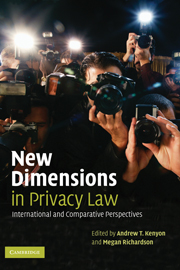Book contents
- Frontmatter
- Contents
- List of contributors
- Preface
- 1 New dimensions in privacy: Communications technologies, media practices and law
- 2 Privacy and freedom of speech
- 3 Revisiting the American action for public disclosure of private facts
- 4 The internet and private life in Europe: Risks and aspirations
- 5 APEC's privacy framework sets a new low standard for the Asia-Pacific
- 6 Copyright, privacy and digital rights management (DRM)
- 7 Why there will never be an English common law privacy tort
- 8 The ‘right’ of privacy in England and Strasbourg compared
- 9 Privacy and constitutions
- 10 Celebrity privacy and benefits of simple history
- Bibliography
- Index
- Index of laws and directives
- Index of case references
8 - The ‘right’ of privacy in England and Strasbourg compared
Published online by Cambridge University Press: 24 July 2009
- Frontmatter
- Contents
- List of contributors
- Preface
- 1 New dimensions in privacy: Communications technologies, media practices and law
- 2 Privacy and freedom of speech
- 3 Revisiting the American action for public disclosure of private facts
- 4 The internet and private life in Europe: Risks and aspirations
- 5 APEC's privacy framework sets a new low standard for the Asia-Pacific
- 6 Copyright, privacy and digital rights management (DRM)
- 7 Why there will never be an English common law privacy tort
- 8 The ‘right’ of privacy in England and Strasbourg compared
- 9 Privacy and constitutions
- 10 Celebrity privacy and benefits of simple history
- Bibliography
- Index
- Index of laws and directives
- Index of case references
Summary
Introduction
It is a theme of great durability in English common law: the judiciary will not – or cannot – develop a general tort of privacy, a refusal recently and most emphatically endorsed by the House of Lords in Wainwright v. Home Office. However, the thesis of this chapter is that the decision of their Lordships in Campbell v. MGN Ltd effectively gives rise to precisely such a tort, albeit with the proviso that there must be some misuse of ‘information’ for a cause of action to lie. While wholly failing to resolve the issue of the horizontal effect of Article 8 in terms of dicta at least, their Lordships made Articles 8 and 10 of the European Convention on Human Rights (ECHR) the centrepiece of the new cause of action they effectively introduced. My argument that a new tort has been introduced in all but name will be based upon two contentions: first, that the second limb of the breach of confidence action – requiring that there must, in addition to being unauthorised use of confidential information be ‘circumstances importing an obligation of confidence’ – has been decisively and unambiguously removed; second that the first limb – that the information must have ‘the quality of confidence’– has been transformed, the notion that the information must be ‘confidential’ having, essentially, morphed into a requirement that it be ‘private’ or ‘personal’ information.
- Type
- Chapter
- Information
- New Dimensions in Privacy LawInternational and Comparative Perspectives, pp. 184 - 228Publisher: Cambridge University PressPrint publication year: 2006



